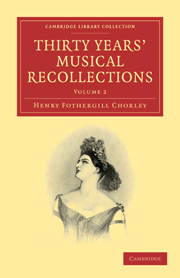Book contents
- Frontmatter
- Contents
- THE YEAR 1847
- THE YEAR 1848 (Her Majesty's Theatre.)
- THE YEAR 1848 (Royal Italian Opera.)
- THE YEAR 1849 (Her Majesty's Theatre.)
- THE YEAR 1849 (Royal Italian Opera.)
- THE YEAR 1850 (Her Majesty's Theatre.)
- THE YEAR 1850 (Royal Italian Opera.)
- THE YEAR 1851 (Her Majesty's Theatre.)
- THE YEAR 1851 (Royal Italian Opera.)
- THE YEAR 1852 (Her Majesty's Theatre.)
- THE YEAR 1852 (Royal Italian Opera.)
- THE YEAR 1853 (Royal Italian Opera.)
- THE YEAR 1854 (Royal Italian Opera)
- THE YEAR 1855 (Royal Italian Opera.)
- THE YEAR 1856 (Her Majesty's Theatre.)
- THE YEAR 1856 (Royal Italian Opera.)
- THE YEAR 1857 (Royal Italian Opera.)
- THE YEAR 1857 (Her Majesty's Theatre.)
- THE YEAR 1858 (Her Majesty's Theatre.—Royal Italian Opera.—Drury Lane.)
- THE YEAR 1859 (Royal Italian Opera.—Drury Lane.)
- The Last Chapter
THE YEAR 1848 (Her Majesty's Theatre.)
Published online by Cambridge University Press: 29 August 2010
- Frontmatter
- Contents
- THE YEAR 1847
- THE YEAR 1848 (Her Majesty's Theatre.)
- THE YEAR 1848 (Royal Italian Opera.)
- THE YEAR 1849 (Her Majesty's Theatre.)
- THE YEAR 1849 (Royal Italian Opera.)
- THE YEAR 1850 (Her Majesty's Theatre.)
- THE YEAR 1850 (Royal Italian Opera.)
- THE YEAR 1851 (Her Majesty's Theatre.)
- THE YEAR 1851 (Royal Italian Opera.)
- THE YEAR 1852 (Her Majesty's Theatre.)
- THE YEAR 1852 (Royal Italian Opera.)
- THE YEAR 1853 (Royal Italian Opera.)
- THE YEAR 1854 (Royal Italian Opera)
- THE YEAR 1855 (Royal Italian Opera.)
- THE YEAR 1856 (Her Majesty's Theatre.)
- THE YEAR 1856 (Royal Italian Opera.)
- THE YEAR 1857 (Royal Italian Opera.)
- THE YEAR 1857 (Her Majesty's Theatre.)
- THE YEAR 1858 (Her Majesty's Theatre.—Royal Italian Opera.—Drury Lane.)
- THE YEAR 1859 (Royal Italian Opera.—Drury Lane.)
- The Last Chapter
Summary
The season of 1848 made it obvious that Mademoiselle Lind was an artist who exhausted as much as she assisted any theatre at which she sang.—Her own prestige was still great; but it became evident that she was not easily to be worked as a member of a company: that her repertory was very limited—and one in which, seemingly, she sought for undivided predominance. The additions to her list of characters this year were in “L'Elisir,” “Lucia,” and “I Puritani.” Seeing that in the second opera a strong tenor, as having “the last word,” must efface the effect of the soprano—there was only a graceful tenor to Mademoiselle Land's Lucia—and the opera pleased, as though it had been a pleasure taken by Lady Grace, “soberly”—in spite of a great and new excellence introduced into it by the heroine—already mentioned—her preparation for the catastrophe of The Bride's madness.
The misfortune to a theatre of a success so preternaturally forced as hers, is to destroy the chances of any who aspire to make a position beside the idol.—The two new ladies brought here to sing when she could not, were heard by the public with the most royal indifference; which, on grounds totally opposite, neither merited.—The first was a young singer then, of high promise; this was Mademoiselle Cruvelli;—the second was a lady who (if no longer in the bloom of her talent) had gained, deservedly, a universal Italian reputation,—this was Madame Tadolini.
- Type
- Chapter
- Information
- Thirty Years' Musical Recollections , pp. 22 - 27Publisher: Cambridge University PressPrint publication year: 2009First published in: 1862

